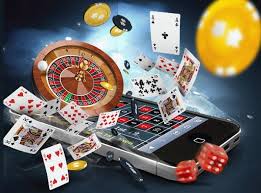Call Now To See How We Can Help!

High stakes often means high rewards, but it also involves significant risks. In various aspects of life, from gambling to business, the principle remains the same—greater risks can lead to greater rewards. For those who seek adrenaline and the excitement of uncertainty, high-stakes experiences offer a unique thrill that can’t be replicated in everyday life. Platforms like Experience High Stakes and High Rewards Online bet winner mali present opportunities for players to engage in games where the stakes are sky-high, amplifying both the tension and the potential payouts. But what drives people to seek these experiences, and what can they gain from them? In this article, we’ll explore the allure of high stakes, the psychology behind risk-taking, and the vital lessons learned from navigating high-pressure situations.
People are often drawn to high-stakes situations for various reasons. The thrill of uncertainty, the allure of fortune, and the challenge of overcoming obstacles frequently entice individuals into risk-taking behavior. High-stakes environments can be exhilarating—they place one on the edge, eliciting feelings of empowerment and excitement. Whether through competitive sports, high-stakes poker games, or critical business ventures, the rush evoked in these moments is simply unmatched.
At the heart of the high-stakes game lies the balance of risk and reward. The equation is straightforward: greater risks can yield greater rewards. However, this potential can also lead to significant losses. Understanding the relationship between risk and reward is crucial for anyone looking to venture into high-stakes scenarios. For instance, when investing in the stock market, high-risk stocks could result in massive gains or devastating losses. The key is to perform due diligence, assess one’s risk tolerance, and make informed decisions.

Engaging in high-stakes experiences taps into our psychological wiring. The excitement that accompanies risk can activate our brain’s reward system, releasing dopamine—the “feel-good” neurotransmitter. This biochemical reaction can create a potential addiction to risk-taking behavior, further driving individuals into high-stakes environments. Additionally, our society often glorifies risk takers—those who dare to defy the odds are celebrated in media, literature, and culture. This societal reinforcement can encourage people to partake in high-stakes activities in search of recognition, success, and fulfillment.
Navigating high-stakes environments offers more than just the thrill of the gamble. These scenarios provide valuable lessons that extend beyond the immediate situation. Individuals often learn the importance of strategy, patience, and emotional control. Whether one emerges victorious or faces defeat, each high-stakes experience contributes to personal growth.
High stakes require a sound strategy. In games like poker, a player must assess their opponents, read the game dynamics, and decide when to bet high or fold. In business, entrepreneurs need to identify market trends, prioritize investments, and create backup plans. Through these experiences, individuals learn to develop strategic thinking—an essential skill in both personal and professional realms.

High-pressure situations often evoke intense emotions. Successful risk-takers cultivate emotional intelligence, allowing them to maintain composure amidst chaos. This ability to manage emotions can be the differentiator during critical moments, impacting not just immediate outcomes but also long-term relationships and career paths.
Engaging in high-stakes activities means embracing the possibility of failure. Learning to accept setbacks is vital in building resilience. Each failure presents an opportunity to reflect, learn, and improve. High-stakes environments teach individuals that losses are part of the journey, leading to eventual success if responded to constructively.
Many famous personalities are renowned for their high-stakes pursuits. From poker champions who have taken the world by storm to entrepreneurs who risked it all to achieve their dreams, these individuals embody the essence of living on the edge. They demonstrate that with calculated risk comes the possibility of extraordinary returns. Consider players such as Phil Ivey or business magnates like Elon Musk—each has faced their share of monumental stakes and dared to push boundaries, ultimately leading to breakthroughs in their respective fields.
Experiencing high stakes is not merely about the gamble or the thrill; it’s about embracing life in its fullest sense. Whether through challenges in gaming, sports, or business, high-stakes encounters provide an avenue for self-discovery, growth, and excitement. Although one must be cautious and prepared for the potential risks involved, diving into these experiences can lead to profound personal transformation and unforgettable memories.
Ultimately, the stakes are as high as one chooses to set them. Each moment presents an opportunity to engage, take risks, and reap the rewards of a life lived boldly. So why not embrace the thrill of high stakes? After all, life itself is a game of chances, and sometimes, the biggest rewards come from taking the greatest risks.